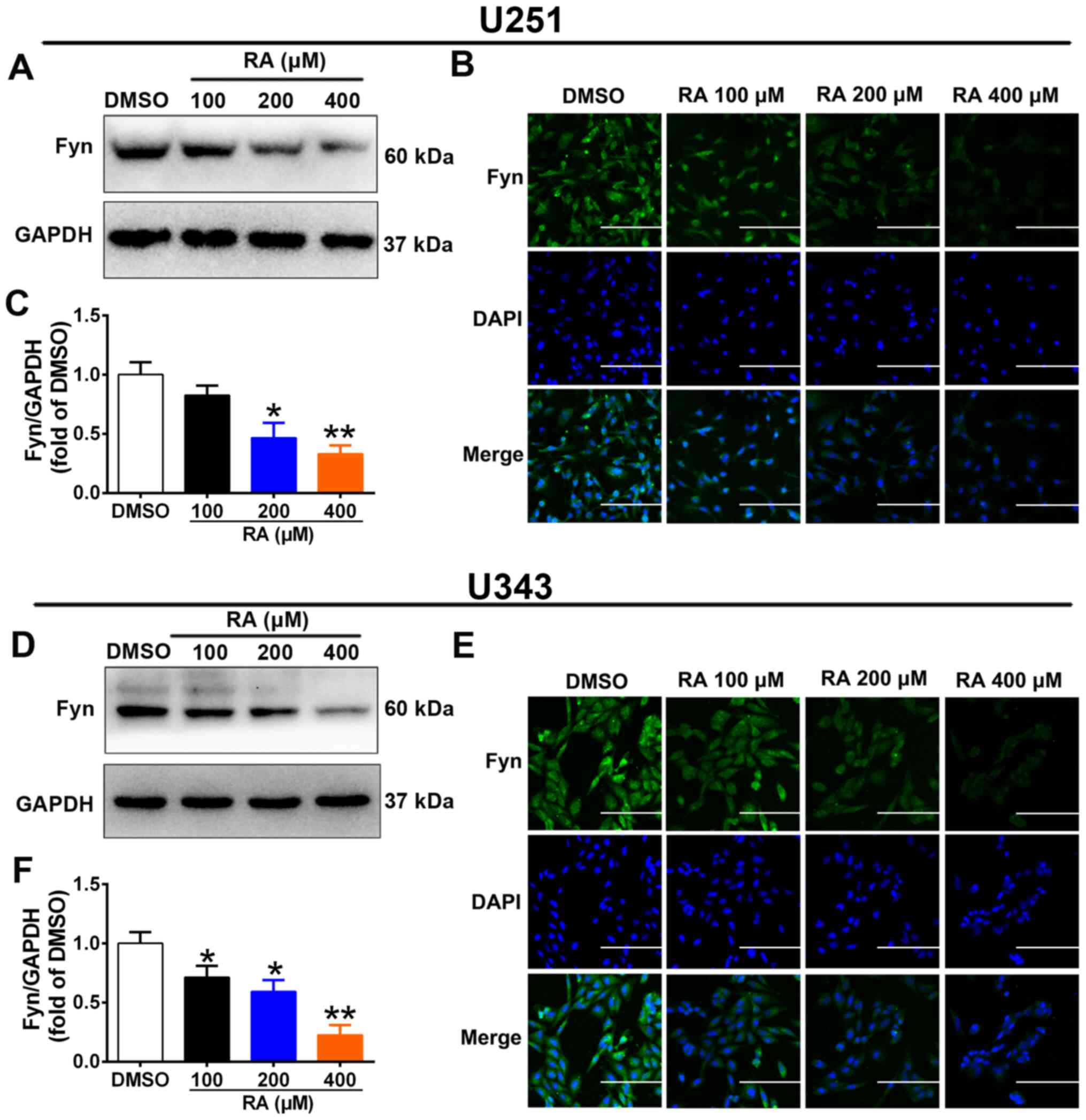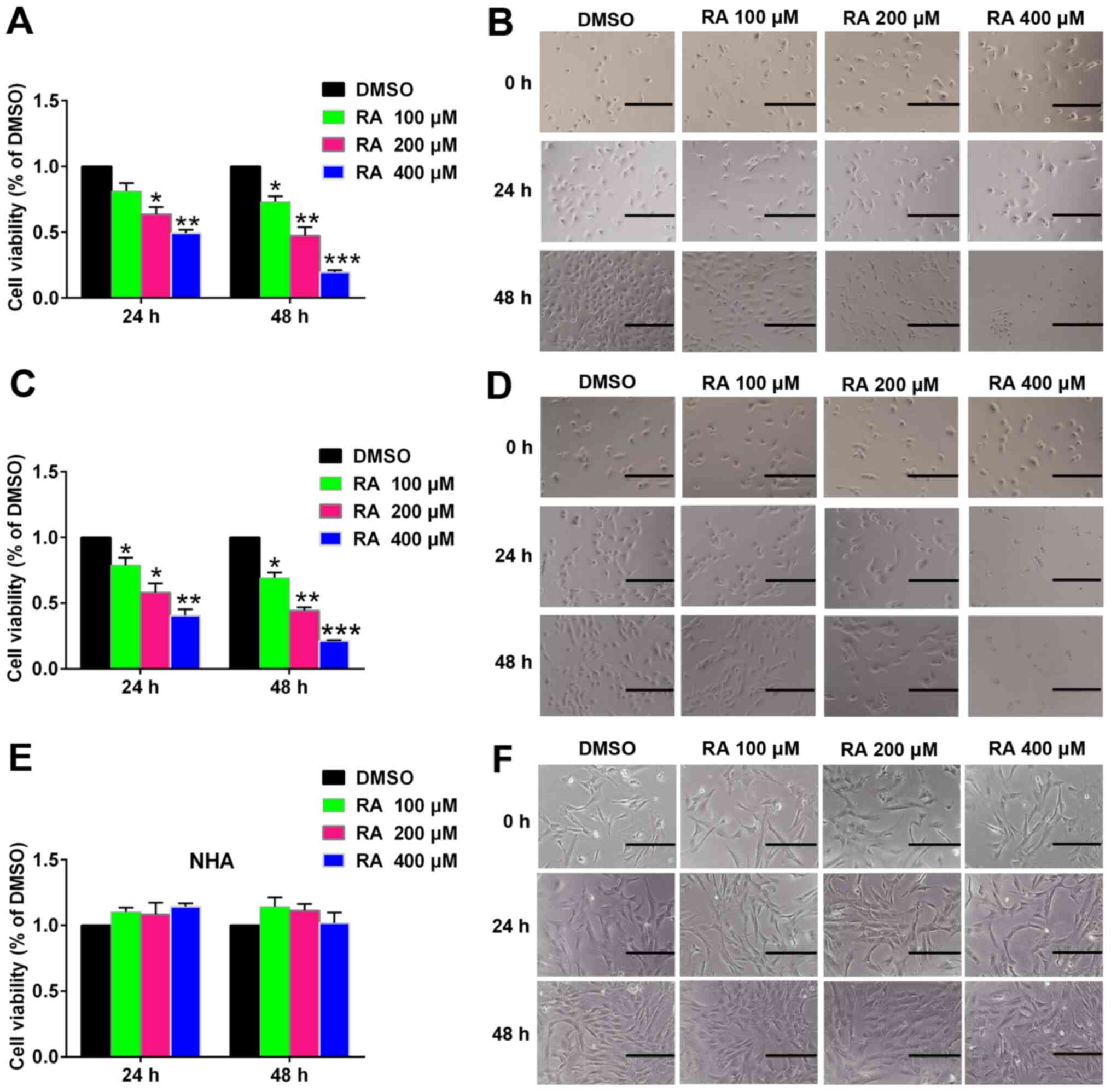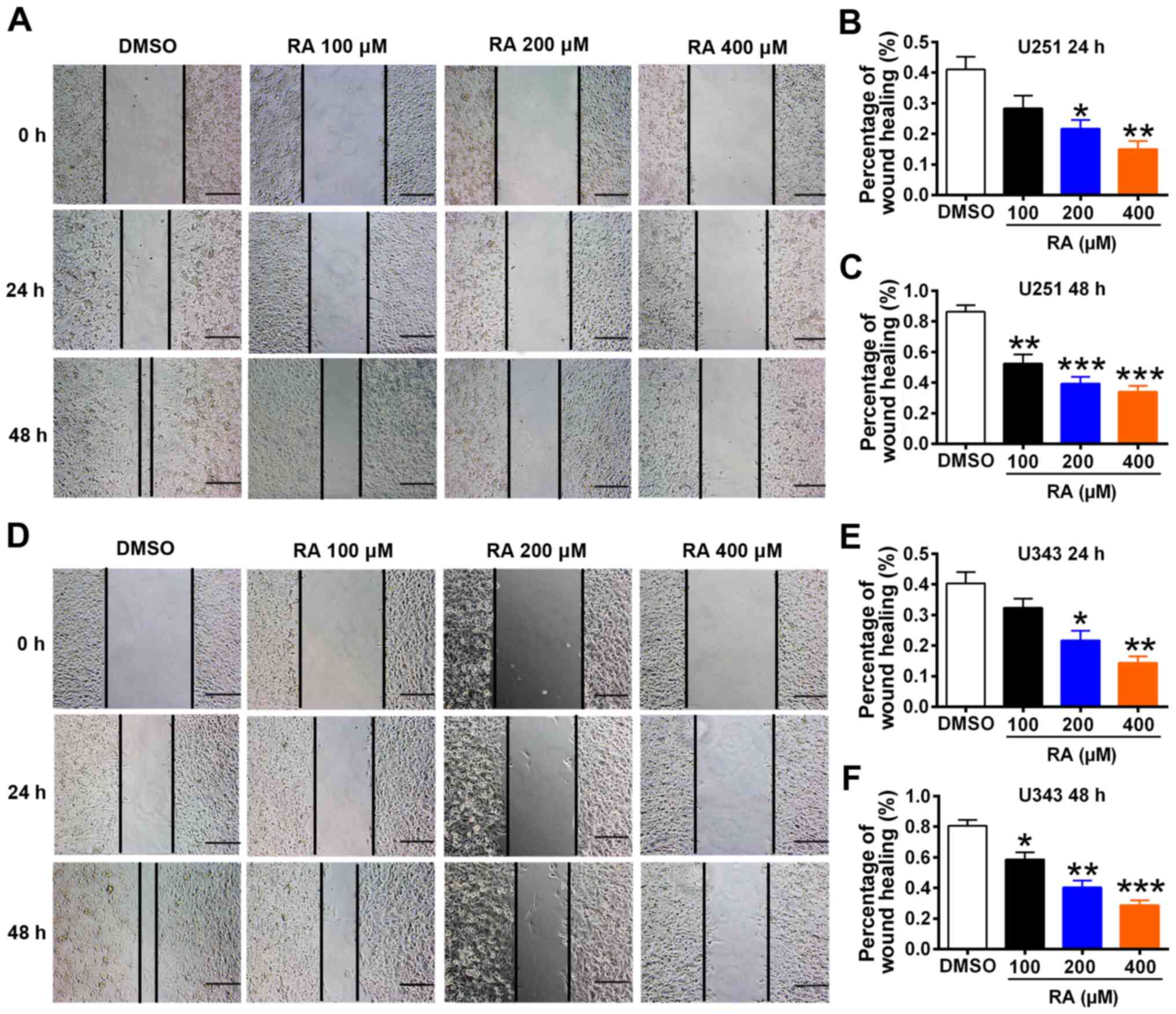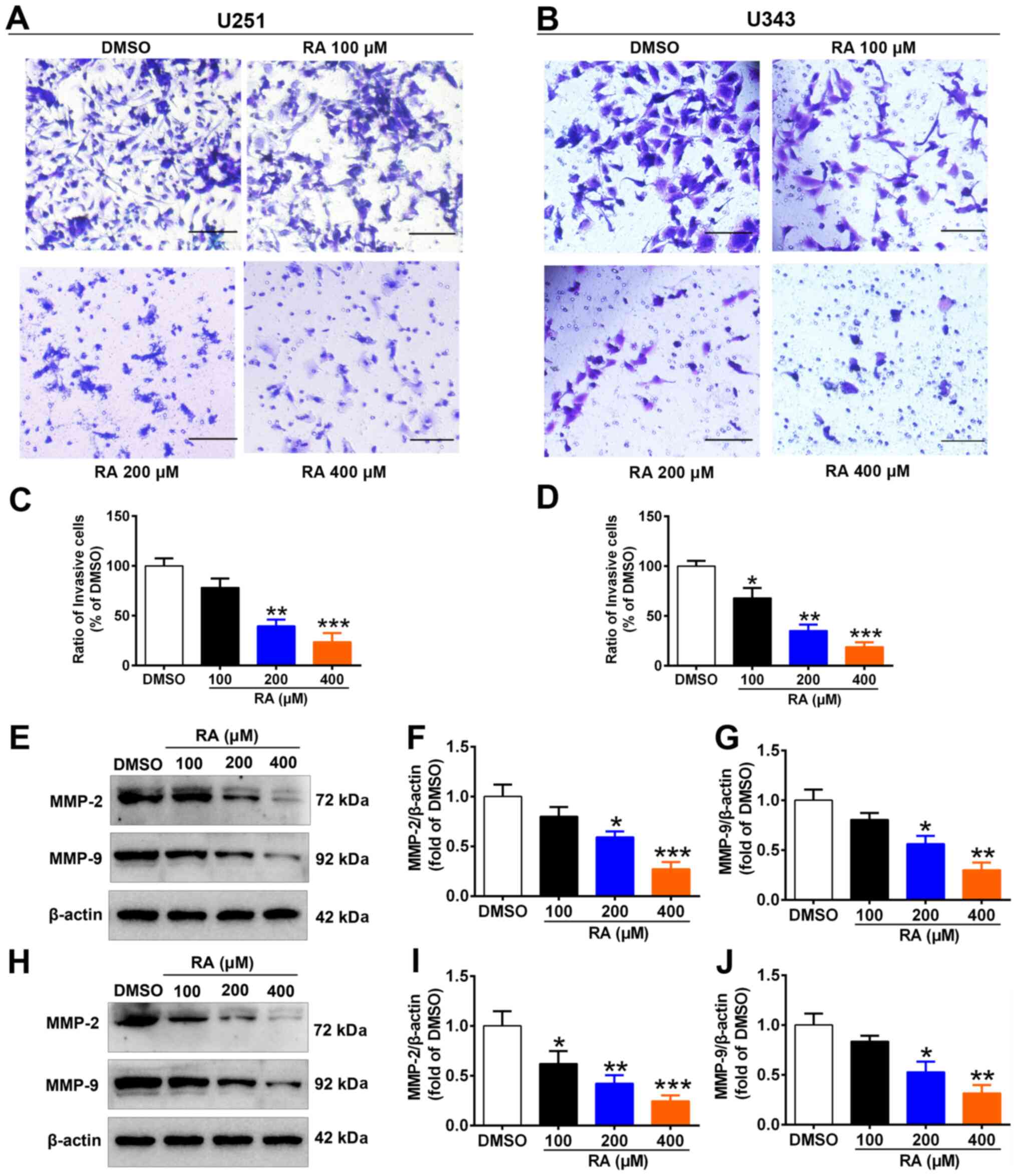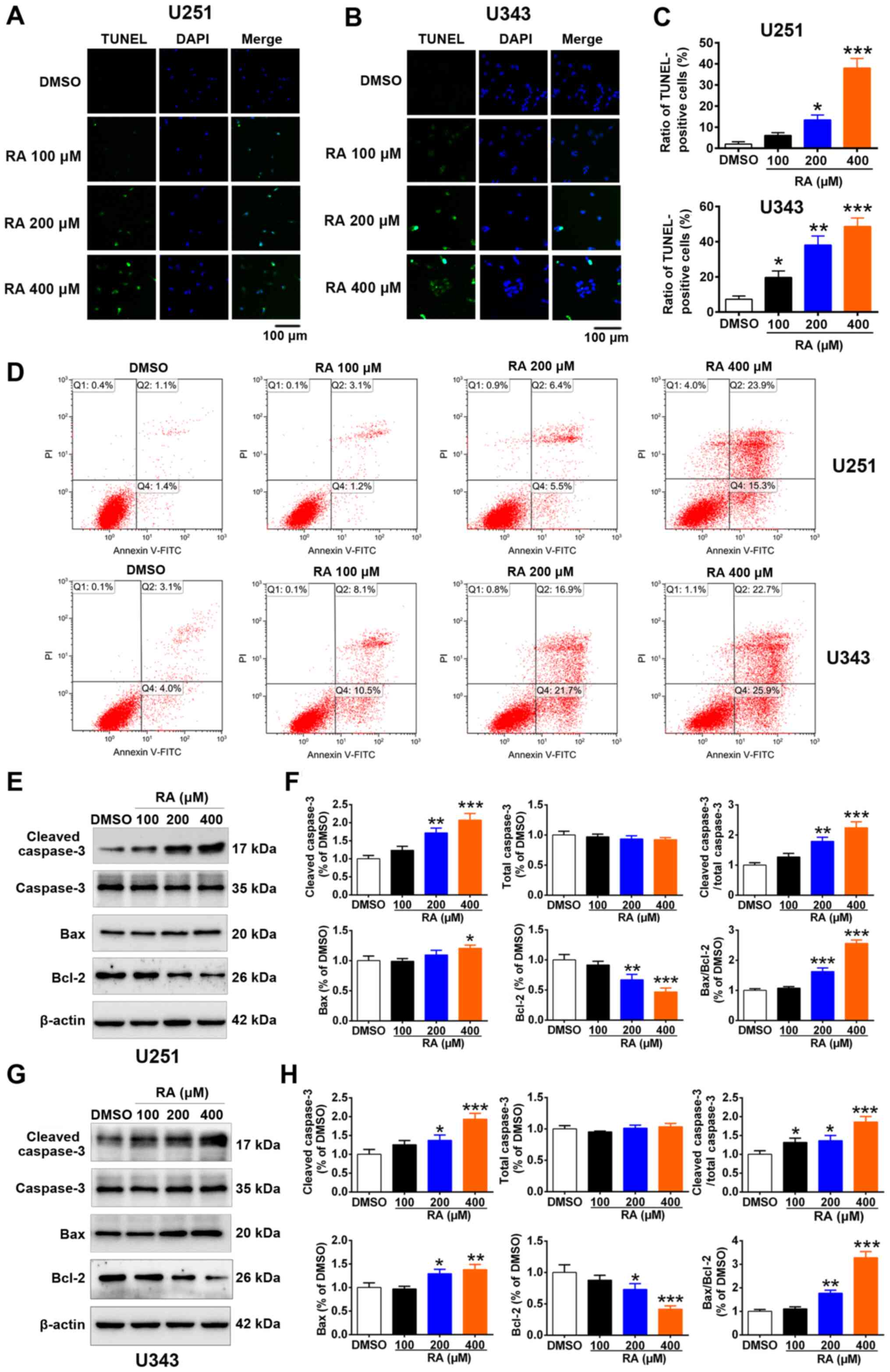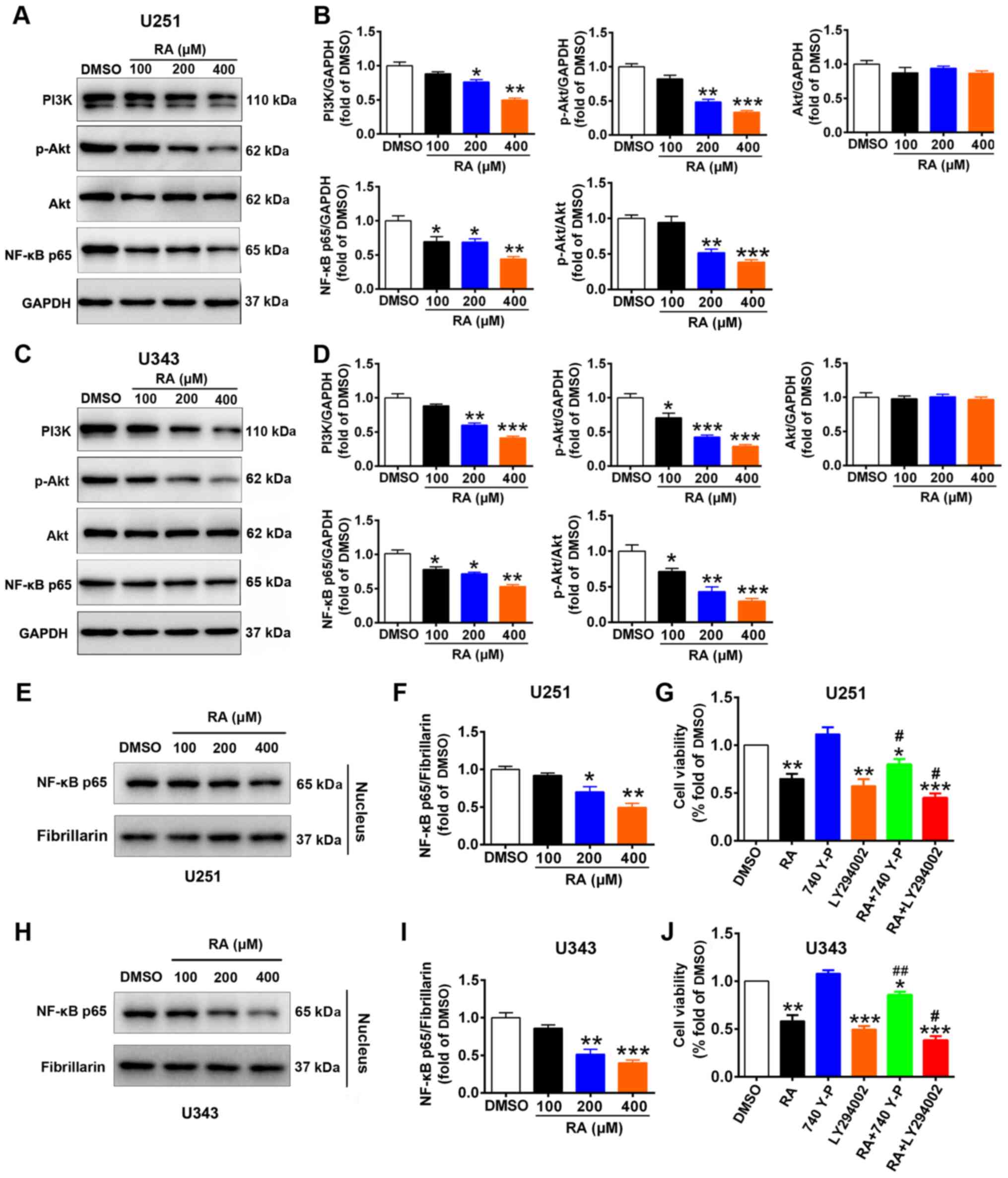|
1
|
Lapointe S, Perry A and Butowski NA:
Primary brain tumours in adults. Lancet. 392:432–446. 2018.
View Article : Google Scholar : PubMed/NCBI
|
|
2
|
Senders JT, Harary M, Stopa BM, Staples P,
Broekman MLD, Smith TR, Gormley WB and Arnaout O: Information-based
medicine in glioma patients: A clinical perspective. Comput Math
Methods Med. 2018:85720582018. View Article : Google Scholar : PubMed/NCBI
|
|
3
|
Batash R, Asna N, Schaffer P, Francis N
and Schaffer M: Glioblastoma multiforme, diagnosis and treatment;
recent literature review. Curr Med Chem. 24:3002–3009. 2017.
View Article : Google Scholar : PubMed/NCBI
|
|
4
|
Stupp R, Mason WP, van den Bent MJ, Weller
M, Fisher B, Taphoorn MJ, Belanger K, Brandes AA, Marosi C, Bogdahn
U, et al: Radiotherapy plus concomitant and adjuvant temozolomide
for glioblastoma. N Engl J Med. 352:987–996. 2005. View Article : Google Scholar : PubMed/NCBI
|
|
5
|
Zhang S, Liao K, Miao Z, Wang Q, Miao Y,
Guo Z, Qiu Y, Chen B, Ren L, Wei Z, et al: CircFOXO3 promotes
glioblastoma progression by acting as a competing endogenous RNA
for NFAT5. Neuro Oncol. 21:1284–1296. 2019. View Article : Google Scholar : PubMed/NCBI
|
|
6
|
El-Sehemy A, Selvadurai H, Ortin-Martinez
A, Pokrajac N, Mamatjan Y, Tachibana N, Rowland K, Lee L, Park N,
Aldape K, et al: Norrin mediates tumor-promoting and -suppressive
effects in glioblastoma via Notch and Wnt. J Clin Invest.
130:3069–3086. 2020. View Article : Google Scholar : PubMed/NCBI
|
|
7
|
Lewis-Tuffin LJ, Feathers R, Hari P,
Durand N, Li Z, Rodriguez FJ, Bakken K, Carlson B, Schroeder M,
Sarkaria JN and Anastasiadis PZ: Src family kinases differentially
influence glioma growth and motility. Mol Oncol. 9:1783–1798. 2015.
View Article : Google Scholar : PubMed/NCBI
|
|
8
|
Irby RB and Yeatman TJ: Role of Src
expression and activation in human cancer. Oncogene. 19:5636–5642.
2000. View Article : Google Scholar : PubMed/NCBI
|
|
9
|
Summy JM and Gallick GE: Src family
kinases in tumor progression and metastasis. Cancer Metastasis Rev.
22:337–358. 2003. View Article : Google Scholar : PubMed/NCBI
|
|
10
|
Frame MC: Src in cancer: Deregulation and
consequences for cell behaviour. Biochim Biophys Acta.
1602:114–130. 2002.PubMed/NCBI
|
|
11
|
Tornillo G, Knowlson C, Kendrick H, Cooke
J, Mirza H, Aurrekoetxea-Rodríguez I, Vivanco MDM, Buckley NE,
Grigoriadis A and Smalley MJ: Dual mechanisms of LYN kinase
dysregulation drive aggressive behavior in breast cancer cells.
Cell Rep. 25:3674–3692.e10. 2018. View Article : Google Scholar : PubMed/NCBI
|
|
12
|
Emaduddin M, Bicknell DC, Bodmer WF and
Feller SM: Cell growth, global phosphotyrosine elevation, and c-Met
phosphorylation through Src family kinases in colorectal cancer
cells. Proc Natl Acad Sci USA. 105:2358–2362. 2008. View Article : Google Scholar : PubMed/NCBI
|
|
13
|
Masaki T, Okada M, Tokuda M, Shiratori Y,
Hatase O, Shirai M, Nishioka M and Omata M: Reduced C-terminal Src
kinase (Csk) activities in hepatocellular carcinoma. Hepatology.
29:379–384. 1999. View Article : Google Scholar : PubMed/NCBI
|
|
14
|
Yadav V and Denning MF: Fyn is induced by
Ras/PI3K/Akt signaling and is required for enhanced
invasion/migration. Mol Carcinog. 50:346–352. 2011. View Article : Google Scholar : PubMed/NCBI
|
|
15
|
Lu KV, Zhu S, Cvrljevic A, Huang TT,
Sarkaria S, Ahkavan D, Dang J, Dinca EB, Plaisier SB, Oderberg I,
et al: Fyn and SRC are effectors of oncogenic epidermal growth
factor receptor signaling in glioblastoma patients. Cancer Res.
69:6889–6898. 2009. View Article : Google Scholar : PubMed/NCBI
|
|
16
|
Han X, Zhang W, Yang X, Wheeler CG,
Langford CP, Wu L, Filippova N, Friedman GK, Ding Q,
Fathallah-Shaykh HM, et al: The role of Src family kinases in
growth and migration of glioma stem cells. Int J Oncol. 45:302–310.
2014. View Article : Google Scholar : PubMed/NCBI
|
|
17
|
Comba A, Dunn PJ, Argento AE, Kadiyala P,
Ventosa M, Patel P, Zamler DB, Núñez FJ, Zhao L, Castro MG and
Lowenstein PR: Fyn tyrosine kinase, a downstream target of receptor
tyrosine kinases, modulates antiglioma immune responses. Neuro
Oncol. 22:806–818. 2020. View Article : Google Scholar : PubMed/NCBI
|
|
18
|
Bowman RL, Wang Q, Carro A, Verhaak RG and
Squatrito M: GlioVis data portal for visualization and analysis of
brain tumor expression datasets. Neuro Oncol. 19:139–141. 2017.
View Article : Google Scholar :
|
|
19
|
Jelić D, Mildner B, Kostrun S, Nujić K,
Verbanac D, Culić O, Antolović R and Brandt W: Homology modeling of
human Fyn kinase structure: Discovery of rosmarinic acid as a new
Fyn kinase inhibitor and in silico study of its possible binding
modes. J Med Chem. 50:1090–1100. 2007. View Article : Google Scholar
|
|
20
|
Şengelen A and Önay-Uçar E: Rosmarinic
acid and siRNA combined therapy represses Hsp27 (HSPB1) expression
and induces apoptosis in human glioma cells. Cell Stress
Chaperones. 23:885–896. 2018. View Article : Google Scholar : PubMed/NCBI
|
|
21
|
Juskowiak B, Bogacz A, Wolek M, Kamiński
A, Uzar I, Seremak-Mrozikiewicz A and Czerny B: Expression
profiling of genes modulated by rosmarinic acid (RA) in MCF-7
breast cancer cells. Ginekol Pol. 89:541–545. 2018. View Article : Google Scholar : PubMed/NCBI
|
|
22
|
Yang SY, Hong CO, Lee GP, Kim CT and Lee
KW: The hepatoprotection of caffeic acid and rosmarinic acid, major
compounds of Perilla frutescens, against t-BHP-induced oxidative
liver damage. Food Chem Toxicol. 55:92–99. 2013. View Article : Google Scholar : PubMed/NCBI
|
|
23
|
Chu X, Ci X and He J, Jiang L, Wei M, Cao
Q, Guan M, Xie X, Deng X and He J: Effects of a natural prolyl
oligopeptidase inhibitor, rosmarinic acid, on
lipopolysaccharide-induced acute lung injury in mice. Molecules.
17:3586–3598. 2012. View Article : Google Scholar : PubMed/NCBI
|
|
24
|
Lin CS, Kuo CL, Wang JP, Cheng JS, Huang
ZW and Chen CF: Growth inhibitory and apoptosis inducing effect of
Perilla frutescens extract on human hepatoma HepG2 cells. J
Ethnopharmaco. 112:557–567. 2007. View Article : Google Scholar
|
|
25
|
Kelsey NA, Wilkins HM and Linseman DA:
Nutraceutical antioxidants as novel neuroprotective agents.
Molecules. 15:7792–7814. 2010. View Article : Google Scholar : PubMed/NCBI
|
|
26
|
Wu CF, Hong C, Klauck SM, Lin YL and
Efferth T: Molecular mechanisms of rosmarinic acid from Salvia
miltiorrhiza in acute lymphoblastic leukemia cells. J
Ethnopharmaco. 176:55–68. 2015. View Article : Google Scholar
|
|
27
|
Xavier CP, Lima CF, Fernandes-Ferreira M
and Pereira-Wilson C: Salvia fruticosa, Salvia officinalis, and
rosmarinic acid induce apoptosis and inhibit proliferation of human
colorectal cell lines: The role in MAPK/ERK pathway. Nutr Cancer.
61:564–571. 2009. View Article : Google Scholar : PubMed/NCBI
|
|
28
|
Yu C, Chen DQ, Liu HX, Li WB, Lu JW and
Feng JF: Rosmarinic acid reduces the resistance of gastric
carcinoma cells to 5-fluorouracil by downregulating FOXO4-targeting
miR-6785-5p. Biomed Pharmacother. 109:2327–2334. 2019. View Article : Google Scholar
|
|
29
|
Yesil-Celiktas O, Sevimli C, Bedir E and
Vardar-Sukan F: Inhibitory effects of rosemary extracts, carnosic
acid and rosmarinic acid on the growth of various human cancer cell
lines. Plant Foods Hum Nutr. 65:158–163. 2010. View Article : Google Scholar : PubMed/NCBI
|
|
30
|
Li W, Du Q, Li X, Zheng X, Lv F, Xi X,
Huang G, Yang J and Liu S: Eriodictyol Inhibits Proliferation,
Metastasis and induces apoptosis of glioma cells via PI3K/Akt/NF-κB
signaling pathway. Front Pharmacol. 11:1142020. View Article : Google Scholar
|
|
31
|
Ko HM, Lee SH, Kim KC, Joo SH, Choi WS and
Shin CY: The role of TLR4 and fyn interaction on
lipopolysaccharide-stimulated PAI-1 expression in astrocytes. Mol
Neurobiol. 52:8–25. 2015. View Article : Google Scholar
|
|
32
|
Zhang T, Ji D, Wang P, Liang D, Jin L, Shi
H, Liu X, Meng Q, Yu R and Gao S: The atypical protein kinase RIOK3
contributes to glioma cell proliferation/survival,
migration/invasion and the AKT/mTOR signaling pathway. Cancer Lett.
415:151–163. 2018. View Article : Google Scholar
|
|
33
|
Yachida S, Jones S, Bozic I, Antal T,
Leary R, Fu B, Kamiyama M, Hruban RH, Eshleman JR, Nowak MA, et al:
Distant metastasis occurs late during the genetic evolution of
pancreatic cancer. Nature. 467:1114–1117. 2010. View Article : Google Scholar : PubMed/NCBI
|
|
34
|
Marín-Ramos NI, Thein TZ, Cho HY, Swenson
SD, Wang W, Schönthal AH, Chen TC and Hofman FM: NEO212 inhibits
migration and invasion of glioma stem cells. Mol Cancer Ther.
17:625–637. 2018. View Article : Google Scholar : PubMed/NCBI
|
|
35
|
Pan H, Xue W, Zhao W and Schachner M:
Expression and function of chondroitin 4-sulfate and chondroitin
6-sulfate in human glioma. FASEB J. 34:2853–2868. 2020. View Article : Google Scholar : PubMed/NCBI
|
|
36
|
Szabo E, Schneider H, Seystahl K, Rushing
EJ, Herting F, Weidner KM and Weller M: Autocrine VEGFR1 and VEGFR2
signaling promotes survival in human glioblastoma models in vitro
and in vivo. Neuro Oncol. 18:1242–1252. 2016. View Article : Google Scholar : PubMed/NCBI
|
|
37
|
Han YH, Kee JY and Hong SH: Rosmarinic
Acid Activates AMPK to inhibit metastasis of colorectal cancer.
Front Pharmacol. 9:682018. View Article : Google Scholar : PubMed/NCBI
|
|
38
|
Niknejad H, Yazdanpanah G and Ahmadiani A:
Induction of apoptosis, stimulation of cell-cycle arrest and
inhibition of angiogenesis make human amnion-derived cells
promising sources for cell therapy of cancer. Cell Tissue Res.
363:599–608. 2016. View Article : Google Scholar : PubMed/NCBI
|
|
39
|
Wang Y, Tang H, Zhang Y, Li J, Li B, Gao
Z, Wang X, Cheng G and Fei Z: Saponin B, a novel cytostatic
compound purified from Anemone taipaiensis, induces apoptosis in a
human glioblastoma cell line. Int J Mol Med. 32:1077–1084. 2013.
View Article : Google Scholar : PubMed/NCBI
|
|
40
|
Su CC, Wang MJ and Chiu TL: The
anti-cancer efficacy of curcumin scrutinized through core signaling
pathways in glioblastoma. Int J Mol Med. 26:217–224.
2010.PubMed/NCBI
|
|
41
|
Zhang WF, Yang Y, Li X, Xu DY, Yan YL, Gao
Q, Jia AL and Duan MH: Angelica polysaccharides inhibit the growth
and promote the apoptosis of U251 glioma cells in vitro and in
vivo. Phytomedicine. 33:21–27. 2017. View Article : Google Scholar : PubMed/NCBI
|
|
42
|
Yang SX, Polley E and Lipkowitz S: New
insights on PI3K/AKT pathway alterations and clinical outcomes in
breast cancer. Cancer Treat Rev. 45:87–96. 2016. View Article : Google Scholar : PubMed/NCBI
|
|
43
|
Arlt A, Gehrz A, Müerköster S, Vorndamm J,
Kruse ML, Fölsch UR and Schäfer H: Role of NF-kappaB and Akt/PI3K
in the resistance of pancreatic carcinoma cell lines against
gemcitabine-induced cell death. Oncogene. 22:3243–3251. 2003.
View Article : Google Scholar : PubMed/NCBI
|
|
44
|
Tomar VS, Patil V and Somasundaram K:
Temozolomide induces activation of Wnt/β-catenin signaling in
glioma cells via PI3K/Akt pathway: Implications in glioma therapy.
Cell Biol Toxicol. 36:273–278. 2020. View Article : Google Scholar
|
|
45
|
Song L, Chen X, Mi L, Liu C, Zhu S, Yang
T, Luo X, Zhang Q, Lu H and Liang X: Icariin-induced inhibition of
SIRT6/NF-κB triggers redox mediated apoptosis and enhances
anti-tumor immunity in triple-negative breast cancer. Cancer Sci.
111:4242–4256. 2020. View Article : Google Scholar : PubMed/NCBI
|
|
46
|
Fahey JM, Korytowski W and Girotti AW:
Upstream signaling events leading to elevated production of
pro-survival nitric oxide in photodynamically-challenged
glioblastoma cells. Free Radic Biol Med. 137:37–45. 2019.
View Article : Google Scholar : PubMed/NCBI
|
|
47
|
Furnari FB, Fenton T, Bachoo RM, Mukasa A,
Stommel JM, Stegh A, Hahn WC, Ligon KL, Louis DN, Brennan C, et al:
Malignant astrocytic glioma: Genetics, biology, and paths to
treatment. Genes Dev. 21:2683–2710. 2007. View Article : Google Scholar : PubMed/NCBI
|
|
48
|
Karachi A, Dastmalchi F, Mitchell DA and
Rahman M: Temozolomide for immunomodulation in the treatment of
glioblastoma. Neuro Oncol. 20:1566–1572. 2018. View Article : Google Scholar : PubMed/NCBI
|
|
49
|
Patil SA, Hosni-Ahmed A, Jones TS, Patil
R, Pfeffer LM and Miller DD: Novel approaches to glioma drug design
and drug screening. Expert Opin Drug Discov. 8:1135–1151. 2013.
View Article : Google Scholar : PubMed/NCBI
|
|
50
|
Xie JH, Lai ZQ, Zheng XH, Xian YF, Li Q,
Ip SP, Xie YL, Chen JN, Su ZR, Lin ZX and Yang XB: Apoptosis
induced by bruceine D in human non-small-cell lung cancer cells
involves mitochondrial ROS-mediated death signaling. Int J Mol Med.
44:2015–2026. 2019.PubMed/NCBI
|
|
51
|
Ong SKL, Shanmugam MK, Fan L, Fraser SE,
Arfuso F, Ahn KS, Sethi G and Bishayee A: Focus on formononetin:
Anticancer potential and molecular targets. Cancers. 11:6112019.
View Article : Google Scholar :
|
|
52
|
Petersen M and Simmonds MS: Rosmarinic
acid. Phytochemistry. 62:121–125. 2003. View Article : Google Scholar
|
|
53
|
Elansary HO and Mahmoud EA: Egyptian
herbal tea infusions' antioxidants and their antiproliferative and
cytotoxic activities against cancer cells. Nat Prod Res.
29:474–479. 2015. View Article : Google Scholar
|
|
54
|
Alcaraz M, Alcaraz-Saura M, Achel DG,
Olivares A, López- Morata JA and Castillo J: Radiosensitizing
effect of rosmarinic acid in metastatic melanoma B16F10 cells.
Anticancer Res. 34:1913–1921. 2014.PubMed/NCBI
|
|
55
|
McCall B, McPartland CK, Moore R,
Frank-Kamenetskii A and Booth BW: Effects of astaxanthin on the
proliferation and migration of breast cancer cells in vitro.
Antioxidants (Basel). 7:1352018. View Article : Google Scholar
|
|
56
|
Shin J, Song MH, Oh JW, Keum YS and Saini
RK: Pro-oxidant actions of carotenoids in triggering apoptosis of
cancer cells: A review of emerging evidence. Antioxidants (Basel).
9:5322020. View Article : Google Scholar
|
|
57
|
Chowdhury I, Thompson WE, Welch C, Thomas
K and Matthews R: Prohibitin (PHB) inhibits apoptosis in rat
granulosa cells (GCs) through the extracellular signal-regulated
kinase 1/2 (ERK1/2) and the Bcl family of proteins. Apoptosis.
18:1513–1525. 2013. View Article : Google Scholar : PubMed/NCBI
|
|
58
|
Yan J, Xu C, Li Y, Tang B, Xie S, Hong T
and Zeng E: Long non-coding RNA LINC00526 represses glioma
progression via forming a double negative feedback loop with AXL. J
Cell Mol Med. 23:5518–5531. 2019. View Article : Google Scholar : PubMed/NCBI
|
|
59
|
Nakabayashi H and Shimizu K: Involvement
of Akt/NF-κB pathway in antitumor effects of parthenolide on
glioblastoma cells in vitro and in vivo. BMC Cancer. 12:4532012.
View Article : Google Scholar
|
















